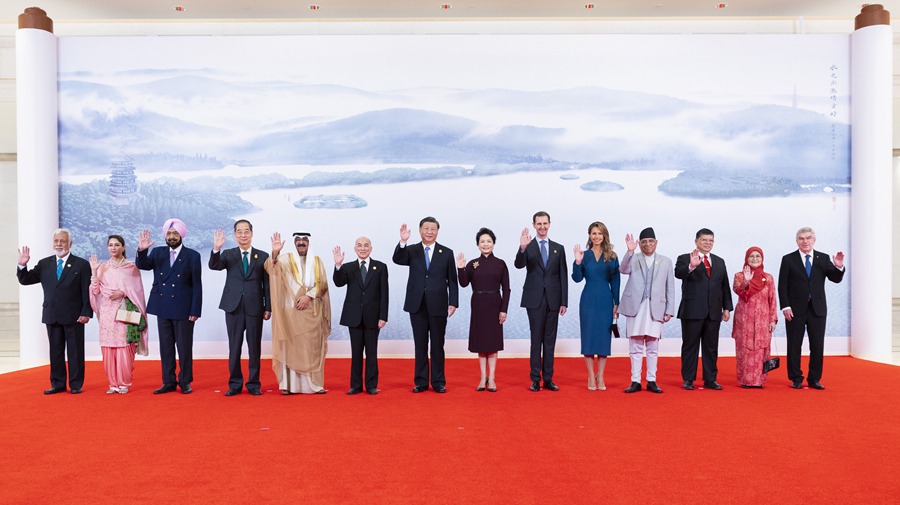Xiao Yong : The Asian Games in Hangzhou opened. According to public reports, foreign leaders who participated in the activities related to the Hangzhou Asian Games this time include the King of Cambodia, The President of Syria, the Crown Prince of Kuwait, the Prime Minister of Nepal, the Prime Minister of Timor-Leste, the Prime Minister of South Korea, the Speaker of the Lower House of the Malaysian Parliament, the representative of the Sultan of Brunei, the representative of the Emir of Qatar, the Prince of Jordan, the Princess of Thailand, and the Deputy Prime Minister of Kyrgyzstan.
As an economic power, a sports power, and China’s right and left neighbor, China should have come to congratulate the happy event.Japan did not come because it still does not want to see China replace Japan as the number one in Asia. When Beijing hosted the Asian Games in 1990, Japan’s GDP was $3.13 trillion, while China’s was $1.89 trillion. At that time, ordinary Chinese people did not have color TVs, refrigerators, washing machines, cameras and other things in their homes, and electrical and electronic products from Japan were the luxury goods of the Chinese of that era. In 2010, China’s GDP surpassed that of Japan. In 2022, 32 years after the Beijing Asian Games, China’s GDP grew nearly tenfold, to $18.1 trillion and Japan’s $4.2 trillion, a modest step. China is not the China of 30 years ago, and Japan is still the Japan of 30 years ago.Although the position has changed for more than a decade, Japan still refuses to acknowledge it. However, Japan also understands that the space constraints of its island countries, the natural constraints of its strategic resources, and the credibility constraints of its history of aggression have determined that it will not easily turn over in its competition with China. In particular, the insular mentality of some Japanese leaders, the fear of retaliation, and the lingering militarism of some Japanese leaders have determined that Japan is unhappy and unconvinced in its relations with China. A close neighbor is better than a distant relative. The express train of China’s development is not a good fit. It is necessary to embrace the United States across the Pacific Ocean.During the 2008 Beijing Olympic Games, then Japanese Prime Minister Yasuo Fukuda made a special trip to China to attend the opening ceremony. It was the first time a Japanese prime minister had attended an Olympic opening ceremony since Munich in 1972. Fukuda said it was to show support for the friendly relations between China and Japan. Due to the epidemic, China did not send high-level leaders to the 2021 Tokyo Olympics. Japan, bearing this in mind, followed the United States in boycotting the 2022 Beijing Winter Olympics and did not send high-level leaders to attend. At the Asian Games in Hangzhou this year, the epidemic has been lifted. Japan’s sports circles and civil society have shown a positive atmosphere of support for the Asian Games in Hangzhou, sending the largest Asian Games delegation in history. However, some Japanese leaders still have a distorted relationship with China.India tampered with each other at the Hangzhou Asian Games, sending three athletes from the so-called Arunachal Pradesh. Arunachal Pradesh has been Chinese territory since ancient times. Since the 1950s, India has not only illegally occupied southern Tibet, but has also carried out a large number of military deployment and military exercises in the region. In 1972, the “Northeast Border Zone” was changed to “Arunachal Central Territory”, and in February 1987, it declared the establishment of the so-called “Arunachal Pradesh”. China has repeatedly solemnly stated that it does not recognize the illegal “state” and demands that India withdraw all military personnel who have set up points across the line. Over the years, India has often played a clever role in Arunachal Pradesh.The Chinese government will not trade anything for its territory and sovereignty. But out of consideration for Asian unity and as the host of the Hangzhou Asian Games, China has issued a special “separate visa” for athletes from the illegal state of Arunachal Pradesh. But India has refused to accept a visa and threatened to withdraw its athletes.Whether the leaders of Japan and India will come or not, the Hangzhou Asian Games will be very exciting. Yesterday’s opening ceremony demonstrated to the world the historic contribution of the Chinese nation to peace and development of mankind, and let the world see the passion, vitality and bright future of the thousand-year-old country in the new era.Asia is Asia for Asians. It is Asia itself that benefits most from the unity of Asia and the mutual trust and close cooperation between China, Japan and India. On the contrary, if the United States succeeds in its divisive strategy, it will not only affect any Asian country such as China, Japan and India, but the tragedy and sorrow of Asia as a whole.At the same time, China has become the number one power in Asia and has the ability to handle relations with other Asian powers and neighbors more rationally and confidently, especially by channeling popular sentiment into the country’s foreign strategy. A healthy and stable China-Japan and China-India relations will only be conducive to Chinese-style modernization and the rejuvenation of the Chinese nation. The Chinese nation can look to the future with an inclusive mind and a mirror on history, and can unite the Asian family around Asia’s own interests.The theme slogan of the Hangzhou Asian Games is “Heart to heart, create the future.” Whatever the reason, as long as there is no Asia, there will be no future for Asia, and the Asian century will not come.



COMMENTS